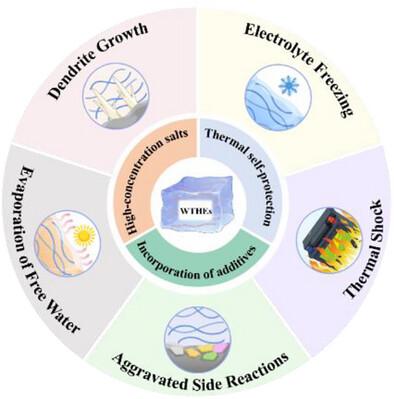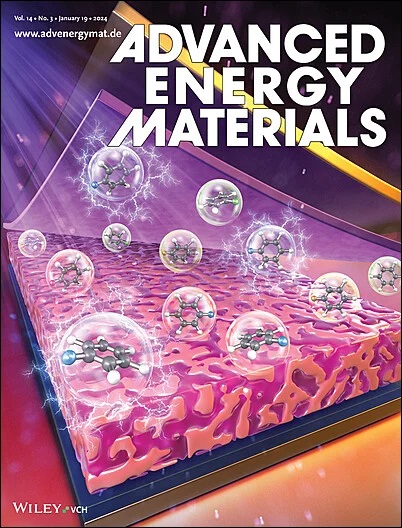耐高温锌离子电池用水凝胶电解质
IF 26
1区 材料科学
Q1 CHEMISTRY, PHYSICAL
引用次数: 0
摘要
水性锌离子电池(azib)由于其成本效益、安全性和环境友好性而成为下一代储能设备的有希望的候选者。然而,传统的液体电解质在宽温度应用中经常遇到挑战,例如狭窄的电化学稳定窗口和电极与电解质之间的界面不稳定。近年来,作为准固态电解质(QEs)的水凝胶电解质(HEs)已被开发用于azib,以提供与液体和固态电解质相关的独特优点。本文首先系统地概述了HEs在极端温度条件下遇到的挑战,包括电解质冻结/蒸发和枝晶生长。随后,对最近提出的用于扩大HEs工作温度范围的改进策略进行了综合分析。最后,对宽温度水凝胶电解质的发展前景进行了展望。预计此次审查将加快在azib中采用WTHEs,并为推进高度安全的储能系统做出有意义的贡献。本文章由计算机程序翻译,如有差异,请以英文原文为准。

Hydrogel Electrolytes for Temperature Robust Aqueous Zinc-Ion Batteries
Aqueous zinc-ion batteries (AZIBs) have emerged as promising candidates for next-generation energy storage devices due to their cost-effectiveness, enhanced safety, and environmental friendliness. However, conventional liquid electrolytes frequently encounter challenges in wide-temperature applications, such as narrow electrochemical stability windows and interfacial instability between electrodes and electrolytes. In recent years, hydrogel electrolytes (HEs) serving as quasi-solid-state electrolytes (QEs) have been developed for AZIBs to offer a unique blend of the benefits associated with both liquid and solid-state electrolytes. This review begins by systematically outlining the challenges encountered by HEs when subjected to extreme temperature conditions, including electrolyte freezing/evaporation and dendrite growth. Subsequently, a comprehensive analysis of the recent modification strategies that have been proposed to expand the operational temperature range of HEs is conducted. In the end, multidimensional perspectives are provided for future development of wide-temperature hydrogel electrolytes (WTHEs). It is anticipated that this review will expedite the adoption of WTHEs in AZIBs and make a meaningful contribution to the advancement of highly safe energy storage systems.
求助全文
通过发布文献求助,成功后即可免费获取论文全文。
去求助
来源期刊

Advanced Energy Materials
CHEMISTRY, PHYSICAL-ENERGY & FUELS
CiteScore
41.90
自引率
4.00%
发文量
889
审稿时长
1.4 months
期刊介绍:
Established in 2011, Advanced Energy Materials is an international, interdisciplinary, English-language journal that focuses on materials used in energy harvesting, conversion, and storage. It is regarded as a top-quality journal alongside Advanced Materials, Advanced Functional Materials, and Small.
With a 2022 Impact Factor of 27.8, Advanced Energy Materials is considered a prime source for the best energy-related research. The journal covers a wide range of topics in energy-related research, including organic and inorganic photovoltaics, batteries and supercapacitors, fuel cells, hydrogen generation and storage, thermoelectrics, water splitting and photocatalysis, solar fuels and thermosolar power, magnetocalorics, and piezoelectronics.
The readership of Advanced Energy Materials includes materials scientists, chemists, physicists, and engineers in both academia and industry. The journal is indexed in various databases and collections, such as Advanced Technologies & Aerospace Database, FIZ Karlsruhe, INSPEC (IET), Science Citation Index Expanded, Technology Collection, and Web of Science, among others.
 求助内容:
求助内容: 应助结果提醒方式:
应助结果提醒方式:


